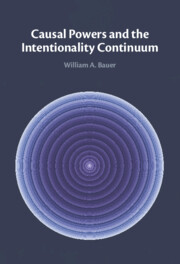Book contents
- Causal Powers and the Intentionality Continuum
- Causal Powers and the Intentionality Continuum
- Copyright page
- Dedication
- Contents
- Figures
- Preface
- Acknowledgments
- Abbreviations
- Introduction
- Part I Why Powers?
- Chapter 1 The Need for Powers
- Chapter 2 The Reality of Pure Powers
- Part II What Are Powers Like?
- Works Cited
- Index
Chapter 1 - The Need for Powers
Three Models of Physical Modality
from Part I - Why Powers?
Published online by Cambridge University Press: 13 October 2022
- Causal Powers and the Intentionality Continuum
- Causal Powers and the Intentionality Continuum
- Copyright page
- Dedication
- Contents
- Figures
- Preface
- Acknowledgments
- Abbreviations
- Introduction
- Part I Why Powers?
- Chapter 1 The Need for Powers
- Chapter 2 The Reality of Pure Powers
- Part II What Are Powers Like?
- Works Cited
- Index
Summary
What accounts for the fact that some physical events occur while others do not? This is a question of physical modality. Three models in contemporary analytic metaphysics have dominated the investigation of physical modality: the Neo-Humean Model, the Universals Model, and the Powers Model. Each model aims to explain, in ontologically conspicuous ways, the unfolding of possibilities in space and time. This chapter explains the Neo-Humean and Universals Models, then shows that while they explicitly deny a place for powers in their fundamental ontologies, they nonetheless implicate powers. That is, they subtly assume the reality of powers. As a result, the Powers Model is the way to go in explaining physical modality. However, there are different ways of conceiving powers. After describing variations of the Powers Model, the chapter returns to the main question posed in the introductory chapter: What is the nature of powers from the inside? Stricter attention to the internality of powers is necessary to better understand the Powers Model and its metaphysical commitments.
Keywords
- Type
- Chapter
- Information
- Causal Powers and the Intentionality Continuum , pp. 21 - 41Publisher: Cambridge University PressPrint publication year: 2022

